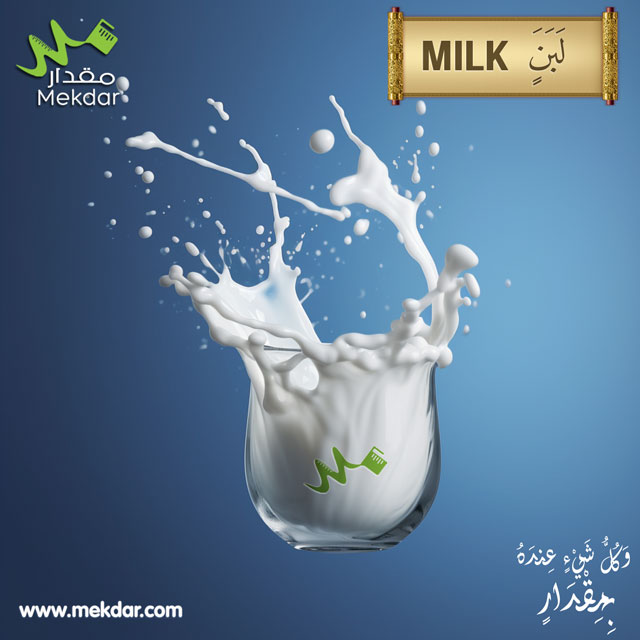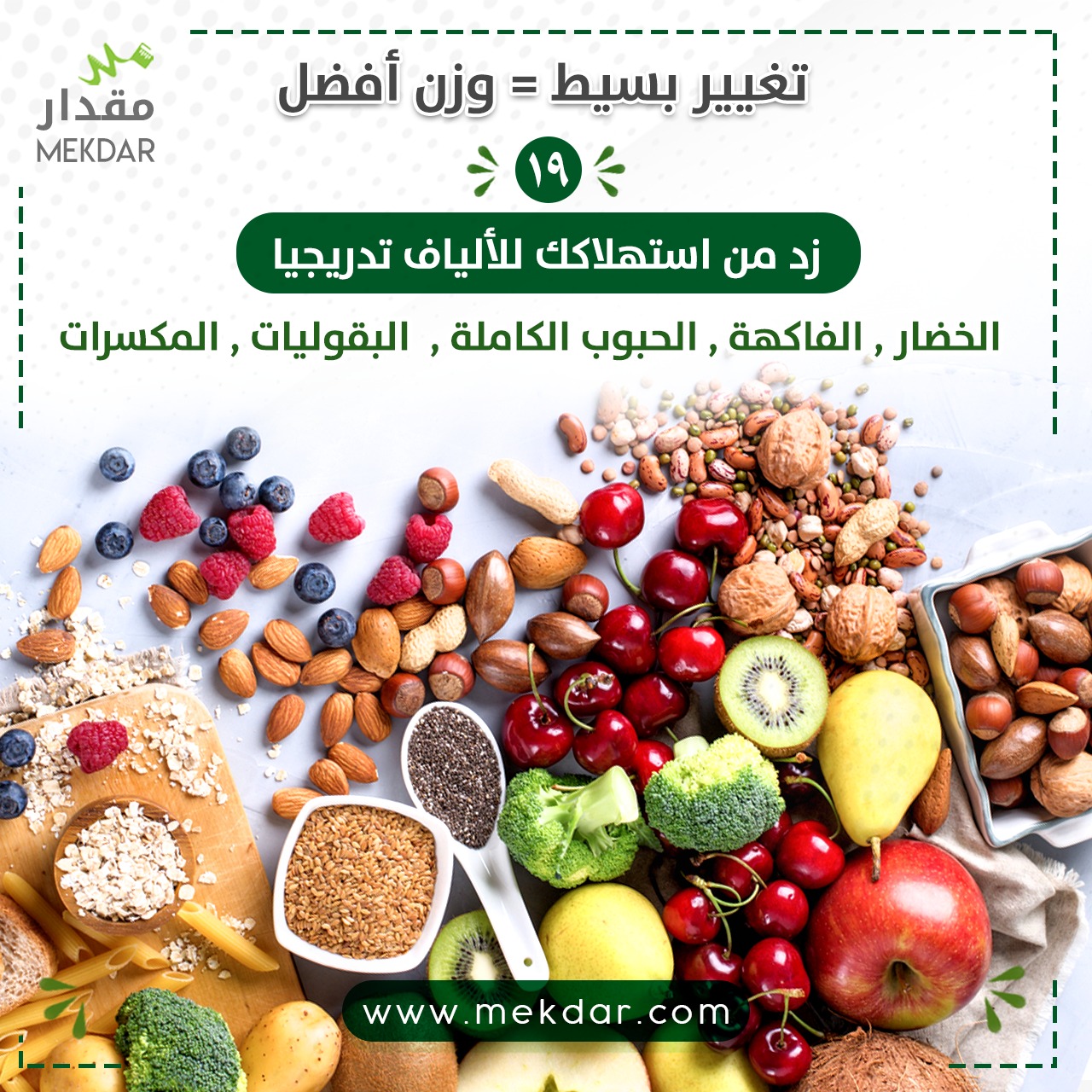د. وليد فؤاد
فوائد اللبن: دليل شامل لقيمته الغذائية ... مع مقدار
The Benefits of Milk: A Comprehensive Guide overview by Mekdar.com
The Benefits of Milk: A Comprehensive Guide - فوائد اللبن: دليل شامل لقيمته الغذائية
تعرف على قيمة الحليب الغذائية والفوائد الصحية العديدة التي يوفرها. اكتشف كيف يمكن للحليب دعم صحة العظام والقلب والغيرها من الفوائد للجسم |
|||
|
يعد اللبن (الحليب) جزءًا من النظام الغذائي للإنسان منذ آلاف السنين. إنه غذاء كثيف بالعناصر الغذائية الأساسية ، بما في ذلك الكالسيوم والبروتين والفيتامينات. يعتبر الحليب أيضًا مكونًا شائعًا في العديد من المنتجات الغذائية ويتم استهلاكه بأشكال مختلفة حول العالم. في هذا الدليل الشامل ، سنستكشف القيمة الغذائية للحليب والفوائد الصحية العديدة التي يوفرها. سواء كنت تبحث عن دعم صحة العظام أو تعزيز صحة القلب أو الحفاظ على وزن صحي ، يمكن للحليب أن يكون إضافة قيمة لنظامك الغذائي.
|
|||
|
|
|
|
|
|
|
|
|
ذكر "اللَبَنٍ" فى القرآن الكريم، فى سورة النحل (١٦) آية ٦٦ كما ذكر "اللَبَنٍ" أيضا فى القرآن الكريم، فى سورة محمد (٤٧) آية ١٥ مَثَلُ الْجَنَّةِ الَّتِي وُعِدَ الْمُتَّقُونَ ۖ فِيهَا أَنْهَارٌ مِنْ مَاءٍ غَيْرِ آسِنٍ وَأَنْهَارٌ مِنْ لَبَنٍ لَمْ يَتَغَيَّرْ طَعْمُهُ وَأَنْهَارٌ مِنْ خَمْرٍ لَذَّةٍ لِلشَّارِبِينَ وَأَنْهَارٌ مِنْ عَسَلٍ مُصَفًّى ۖ وَلَهُمْ فِيهَا مِنْ كُلِّ الثَّمَرَاتِ وَمَغْفِرَةٌ مِنْ رَبِّهِمْ ۖ كَمَنْ هُوَ خَالِدٌ فِي النَّارِ وَسُقُوا مَاءً حَمِيمًا فَقَطَّعَ أَمْعَاءَهُمْ ﴿١٥﴾
|
|
|
نبذة تاريخية لقرون ، كان الحليب مصدرًا حيويًا للتغذية للإنسان والحيوانات. أتاح ترويض الأبقار والماعز وغيرها من الحيوانات الحلوب إنتاج واستهلاك الحليب بشكل واسع. اليوم ، يتم استهلاك الحليب ومنتجات الألبان الأخرى في جميع أنحاء العالم وهي جزء مهم من العديد من الثقافات والمطابخ.
|
|
القيمة الغذائية
يعد الحليب غذاءً كثيفًا بالعناصر الغذائية الأساسية، إنه مصدر ممتاز للكالسيوم والبروتين والفيتامينات ، بما في ذلك فيتامين د وفيتامين ب ١٢. الكالسيوم أساسي لصحة العظام ، بينما البروتين ضروري لنمو وإصلاح العضلات.
بالإضافة إلى ذلك ، يحتوي الحليب على مجموعة متنوعة من العناصر الغذائية الأخرى ، مثل الفوسفور والبوتاسيوم والمغنيسيوم ، المهمة للحفاظ على الصحة الجيدة.
التركيب الغذائي للحليب
الحليب هو مزيج مركب من العناصر الغذائية ، بما في ذلك الكربوهيدرات والبروتينات والدهون والفيتامينات والمعادن. يختلف التركيب الغذائي للحليب باختلاف عوامل مثل سلالة الأبقار والنظام الغذائي للحيوان ومرحلة الرضاعة. ومع ذلك ، يوضح الجدول أدناه متوسط تكوين حليب البقر.
كمية المغذيات لكل ١٠٠ مل
طاقة ٦٠ كالوري
بروتين ٣،٢ جم
الكربوهيدرات ٤،٨ جرام
دهون ٣،٦ جم
كالسيوم ١٢٠ مجم
فوسفور ٩٧ مجم
فيتامين د ١،٢ ميكروجرام
فيتامين ب ١٢ ٠،٤ ميكروغرام
ريبوفلافين (ب ٢) ٠،١٥ مجم
نياسين (ب ٣) ٠،١ مجم
حمض الفوليك (ب ٩) ٣ ميكروغرام
المصدر: قاعدة بيانات المغذيات الوطنية لوزارة الزراعة الأمريكية كمرجع معياري
الكالسيوم
الكالسيوم معدن أساسي مهم لبناء عظام وأسنان قوية والحفاظ عليها. يعتبر الحليب مصدرًا ممتازًا للكالسيوم ، حيث يحتوي على ١٢٠ مجم لكل ١٠٠ مل. كما أن امتصاص الكالسيوم من الحليب مرتفع أيضًا ، حيث أظهرت الدراسات أن الجسم يمتص ما يقرب من ٣٠-٣٥٪ من الكالسيوم الموجود في الحليب.
بروتين
يعتبر الحليب مصدرًا جيدًا للبروتين عالي الجودة ، وهو مهم للحفاظ على أنسجة الجسم وإصلاحها. يتكون البروتين الموجود في الحليب من نوعين: الكازين (٨٠٪) ومصل اللبن (٢٠٪). كلا النوعين من البروتين سهل الهضم ويحتويان على جميع الأحماض الأمينية الأساسية التي يحتاجها الجسم.
دهون
يحتوي الحليب على كمية كبيرة من الدهون ، تقدر بحوالي ٣،٦ جرام لكل ١٠٠ مل. تتكون الدهون في الحليب من أحماض دهنية مشبعة وأحادية غير مشبعة ومتعددة غير مشبعة.
فيتامينات
الحليب مصدر جيد للفيتامينات وخاصة فيتامين د وفيتامين ب ١٢. فيتامين د مهم لامتصاص الكالسيوم والحفاظ على عظام قوية. فيتامين ب ١٢ مهم لعمل الجهاز العصبي وإنتاج خلايا الدم الحمراء.
المعادن
يعتبر الحليب أيضًا مصدرًا جيدًا للمعادن مثل الفوسفور والبوتاسيوم والمغنيسيوم ، والتي تعتبر مهمة لوظائف الجسم المختلفة.
الفوائد الصحية للحليب
تم ربط استهلاك الحليب بالعديد من الفوائد الصحية ، بما في ذلك:
صحة العظم
كما ذكرنا سابقًا ، يعتبر الحليب مصدرًا ممتازًا للكالسيوم ، وهو أمر مهم لبناء عظام قوية والحفاظ عليها. أظهرت الدراسات أن استهلاك الحليب ومنتجات الألبان الأخرى يرتبط بزيادة كثافة المعادن في العظام وتقليل خطر الإصابة بهشاشة العظام.
تنمية العضلات
يعتبر البروتين عالي الجودة الموجود في الحليب مهمًا لتنمية كتلة العضلات والحفاظ عليها. أظهرت الدراسات أن تناول الحليب بعد التمرين يمكن أن يعزز تخليق البروتين العضلي ويحسن التعافي.
صحة القلب
تشير بعض الدراسات إلى أن استهلاك منتجات الألبان قد يكون له تأثير وقائي على القلب بالفعل. على سبيل المثال ، وجد التحليل الإحصائي الكبير لعام ٢٠١ ٧ لـ ٢٩ دراسة أن استهلاك منتجات الألبان ، بما في ذلك الحليب ، كان مرتبطًا بانخفاض خطر الإصابة بأمراض القلب والأوعية الدموية.
التحكم في الوزن
يمكن أن يلعب الحليب أيضًا دورًا في ضبط الوزن. يمكن أن يساعد البروتين الموجود في الحليب على زيادة الشعور بالشبع وتقليل تناول السعرات الحرارية بشكل عام. بالإضافة إلى ذلك ، أظهرت الدراسات أن استهلاك منتجات الألبان قليلة الدسم يرتبط بانخفاض خطر الإصابة بالسمنة.
اشارت ورقة بحثية ٩ نشرت عام ٢٠٢٠، إلى أن تناول منتجات الألبان مع الوجبات عالية الكربوهيدرات والدهون قد يساعد في تقليل مخاطر الاختلال الوظيفي الأيضي وأمراض القلب والأوعية الدموية عن طريق تقليل ارتفاعات الجلوكوز والدهون الثلاثية بعد الأكل. هذا بسبب الآثار المفيدة المحتملة لبروتينات الألبان والمركبات النشطة بيولوجيًا. ولكن هناك حاجة إلى مزيد من البحث لفهم الآليات الكامنة وراء هذه التأثيرات بشكل كامل ولتحديد الكمية والنوع الأمثل من منتجات الألبان للاستهلاك.
كفاية العناصر الغذائية
الحليب هو غذاء غني بالعناصر الغذائية ويوفر مجموعة متنوعة من العناصر الغذائية الأساسية. يمكن أن يساعد استهلاك الحليب ومنتجات الألبان الأخرى في ضمان تلبية الأفراد لاحتياجاتهم اليومية من الكالسيوم وفيتامين د والعناصر الغذائية الأخرى.
السلبيات المحتملة لاستهلاك الحليب
بينما يمكن أن يوفر الحليب العديد من الفوائد الصحية ، إلا أنه قد لا يكون مناسبًا للجميع. قد يعاني بعض الأشخاص من ردود فعل سلبية تجاه الحليب ، مثل عدم تحمل اللاكتوز أو حساسية الحليب.
الخاتمة
في الخلاصة ، يعد اللبن (الحليب) إضافة قيمة لنظام غذائي صحي ومتوازن. إنه يوفر العديد من العناصر الغذائية الأساسية و يدعم صحة العظام والقلب والوزن الصحي. وبالتالي ، ينبغي أن يتضمن الحليب كجزء من نظامك الغذائي اليومي.
يجب الاهتمام بأنواع الحليب المختلفة المتاحة ، حيث يمكن أن يختلف تركيبها وقيمتها الغذائية. بالإضافة إلى ذلك ، يجب أيضًا الأخذ في الاعتبار أي حساسية لمنتجات الألبان وضرورة تجنبها.
تحميل تطبيق مقدار للهواتف الاندرويد
تحميل تطبيق مقدار للهواتف الآيفون
المصادر و المراجع
-
Weaver, C. M. (2014). Should dairy be recommended as part of a healthy vegetarian diet? Counterpoint. The American journal of clinical nutrition, 99(5), 1233S-1237S.
-
U.S. Department of Agriculture, Agricultural Research Service. (2019). USDA National Nutrient Database for Standard Reference, Release 28. Retrieved from https://fdc.nal.usda.gov/
-
Fardet, A., & Rock, E. (2018). Toward a new philosophy of preventive nutrition: from a reductionist to a holistic paradigm to improve nutritional recommendations. Advances in Nutrition, 9(6), 759-769.
-
Rizzoli, R., Biver, E., & Bonjour, J. P. (2018). Milk and dairy consumption on bone health: beneficial role of lactose and other components. Osteoporosis International, 29(3), 535-542.
-
Phillips, S. M., & Van Loon, L. J. (2011). Dietary protein for athletes: from requirements to optimum adaptation. Journal of sports sciences, 29(sup1), S29-S38.
-
Aune, D., Keum, N., Giovannucci, E., Fadnes, L. T., Boffetta, P., Greenwood, D. C., ... & Norat, T. (2017). Dairy products and colorectal cancer risk: a systematic review and meta-analysis of cohort studies. Annals of Oncology, 28(8), 1788-1801.
-
de Oliveira Otto, M. C., Mozaffarian, D., Kromhout, D., Bertoni, A. G., Sibley, C. T., Jacobs Jr, D. R., ... & Alonso, A. (2017). Dietary intake of dairy products, calcium, and vitamin D and the risk of hypertension in middle-aged and older women. Hypertension, 69(4), 704-712.
-
Chen, M., Sun, Q., Giovannucci, E., & Mozaffarian, D. (2016). Dairy consumption and risk of type 2 diabetes: 3 cohorts of US adults and an updated meta-analysis. BMC medicine, 14(1), 1-12.
-
Leary M, Tanaka H. Role of Fluid Milk in Attenuating Postprandial Hyperglycemia and Hypertriglyceridemia. Nutrients. 2020 Dec 11;12(12):3806. doi: 10.3390/nu12123806. PMID: 33322540; PMCID: PMC7763034.
Learn about the nutritional value of milk and the numerous health benefits it provides. Discover how milk can support bone health, heart health, and more.

08 Apr 2023
by:











